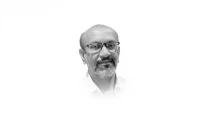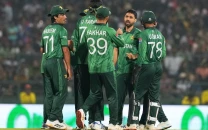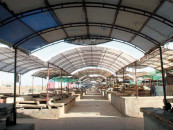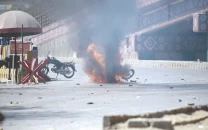Notes on alignment issues
Pakistan must align vision with direction, discipline with purpose, power with principle

There are clear lessons to be learned from our national experience with alignments and misalignments in this era of dramatic emergent reality. This becomes a significant concern while considering the vicious boom-and-bust cycle in Pakistani history. We associate the phrase 'boom and bust cycle' with economic performance, which, to a large extent, is true. But the story is the same in every walk of life. This becomes particularly evident when we observe the dramatic changes in direction that have occurred in every decade of our national existence. Every now and then, we change direction and want a fresh start, a clean break from the past. This usually results in bedlam. Ask yourself how many times momentary spikes have led to great expectations which ended up in the same age-old rut?
This historical pattern also informs our scepticism bordering on cynicism, even when we see solid results with our own eyes. I do not rule out foul play on the part of the enemy. It is an enemy's job to exploit your weaknesses. It is your duty not to allow it the opportunity. We can surely stop providing our rivals with more cannon fodder.
Before I proceed with this quest, let us highlight the green shoots of success. Since this May, a sense of growing confidence has spread throughout the country, with many hearts feeling that the nation is gaining respect. You know what happened in May. However, even before that, we can see an effort to correct our direction. It all starts with economics. And it all starts with this prime minister. The moment I started paying attention was when this PM, during his previous stint, went the extra mile to snatch a standby agreement from the jaws of a failing IMF extended fund facility on its final day. Since he returned to power, his choice of the economic team and working in close coordination with military diplomacy have helped stabilise the economy. Do you remember the social media fun poked at him? Even today, pointing this out will probably enrage many unlikely individuals. But then they should know better. I have little use for partisan politics. I worry only about the national well-being. Whosoever goes an extra mile in contributing to that gets my immediate and unrelenting admiration.
The same goes for the current army chief. It was during his tenure that Pakistan regained its international stature, which seems to grow by leaps and bounds. The same diplomatic pressures that existed during the Pulwama-Balakot crisis must also be in place after the Pahalgam incident. However, a careful examination of the long-term impact of available policy choices ensured that the country receives the admiration and respect it deserves. It is a refreshing departure from the days when we were told our military vehicles are corroding and we lack fuel to fight wars. That is not all. His deep understanding of religious and military matters has made it difficult for would-be propagandists to weaken his resolve in the war on terror. We seem to have finally cracked the code which has animated the spectre of terrorism on our soil.
But momentary success can breed complacency.
Of course, the country still has a long way to go. That is why the issue of alignment is so important. You are on the road and covering large distances in short intervals, but if you are unsure of your destination, you are most likely to lose both momentum and direction. Do you need a critical example? Operation Zarb-e-Azb, to a great extent, very successfully uprooted terrorism plaguing our soil. Operation Rad-ul-Fasad must have contributed to its elimination. But then the country took a U-turn following the Taliban's takeover of Kabul and ended up bringing back the plague.
So, in which direction should we move? Here comes the first crucial lesson. Ideology can be burdensome. For the first fifty-five years, we honed a particular version of national ideology. When the blowback came, forcing the nation to correct its course, the old narrative became a source of great suffering. When politics and ideology intermingle, you look for easy, simplistic, catchy slogans. However, generations later, when the atmospherics change, countries have to work really hard to amend those slogans. If you want to see examples, look at what Deng Xiaoping had to do to open up the Chinese market. Or what President Trump has to do to ensure that America's self-image is not weaponised against the country for extortion.
Today's India has already proven without a shadow of doubt that Pakistan's creation was indeed the right call. We no longer need to live in the past. The future beckons. The question is, what kind of future do you want? If I am allowed to speak without the fear of further victimisation, may I submit that a rapidly progressing nation, which is in complete harmony within and without, should do the trick? The nation should be prosperous, and this prosperity should result in each citizen's prosperity. The country should have good relations with its neighbours. However, it should not come at the cost of national dignity, interest, or the well-being of its citizens.
Second self-explanatory lesson. Never let go of any opportunity when it presents itself. Hug allies so closely that they can never doubt your sincerity. Work diligently to build relations with neutral countries. Of course not at the cost of existing relations.
Third, once a direction is picked, charge ahead as if your life depends on it.
Fourth, invest heavily in education, research and development.
Fifth, beware of Sonny Corleones. For those who haven't read Mario Puzo's novel or seen the first Godfather movie, Sonny Corleone is Don Corleone's son. While well-meaning, he is publicly tempted by an offer which is too good to be true. Because of his eagerness and the Don's reluctance, the other party thinks that if they remove the old man from the picture, they can get a deal. It all results in unnecessary violence, damage to the family's interests and eventually hotheaded Sonny's own demise. Before the current setup, the country seemed divided into two powerful factions, one enamoured by the love for the Taliban, the other by the burning desire to normalise relations with Modi's India at any cost. You could see two Sonny Corleones wrecking the national interest for personal, myopic visions. Normalisation is good, but why rush into it without preparing the proper ground? This cultural reference remains relevant today, and it will continue to be so tomorrow.
Sixth, for a country that has most of its life in the eye of the storm and which has powerful enemies, eternal vigilance is the price of liberty. That means a stronger counterintelligence response and a conviction to spare no sacred cow.
Final lesson: learn to distinguish between national interest and political interests, dummies.
Now tell me which of the above lessons you disagree with and which should lead to my continued persecution?














COMMENTS
Comments are moderated and generally will be posted if they are on-topic and not abusive.
For more information, please see our Comments FAQ